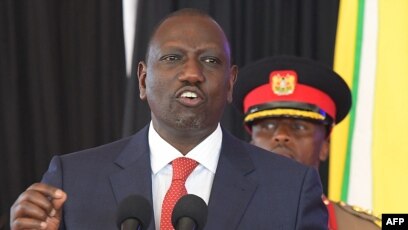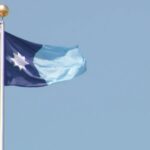More than 700 delegates and 300 companies participated in the third edition of the American Chamber of Commerce summit in the Kenyan capital, Nairobi, organizers said. U.S. government and private sector delegations met with counterparts from Rwanda, Tanzania, Uganda, Ethiopia and Kenya.
Kenya President William Ruto said Thursday that Kenya was open for business, highlighting a deal his government had struck with U.S. biotech company Moderna.

“It is with pleasure that I announced the finalized deal between Moderna and the government of Kenya to build a $500 million dollar MRNA vaccine facility in Nairobi,” he said.
The two-day AmCham business summit, which ended Thursday, gave business leaders a chance to exchange market intelligence and explore areas of opportunity, especially for commercial engagement, said Maxwell Okello, CEO of AmCham Kenya.
He noted that it followed the recent U.S.-Africa Leaders Summit hosted by the White House.
AmCham “does two things: … One: it’s a perfect demonstration of some of the commitments we had from the U.S. … Two: we are very keen in seeing how we can actually advance commercial engagement,” Okello said. “We thought this would be a good platform to create partnerships, bring local companies that could be counterparts to those American companies that are interested in coming into Kenya.”
Scott Eisner, president of the U.S. Chamber’s Africa Business Center, brought a group of over 30 executives. He told VOA they hoped to forge concrete private sector opportunities and joint ventures.
“We have plenty of tech companies with us, but we also have pharmaceuticals, medical devices, technology, satellite companies that are doing mapping of the world, infrastructure developers around Caterpillar, the GEs of the world,” he said. “So we really have arranged for a very strong delegation representing the complexities of the American business community.”
Nzonzi Katana is a process engineer for the Kenyan-based startup Semiconductor Technologies Limited, which had a booth at the exhibition hall. The company manufactures microprocessors, memory chips and sensors.
“We have been able to meet many representatives from many American companies,” Katana said. “I believe there’s one person who might be a potential supplier of our raw material.”
Effects of protests
Kenya is experiencing protests organized by opposition leader Raila Odinga over the high cost of living, and three people have died in clashes with police. How might this affect possible investors?
Whitney Baird, an official in the State Department’s Bureau of Economic and Business Affairs, said Washington keeps U.S. companies informed about each country’s political and security situation.
“The U.S. government produces publications every year like the investment climate statement, country commercial guide, so there is information available to any businesses about what we’ve observed over a year,” Baird said. She said Kenya has a strong democratic tradition, and “we were very pleased with the elections,” but she urged any incoming U.S. business to “engage with our commercial and economic sections at the embassy and get the most up to date information about opportunities and the ongoing situation.”
At the summit, seven African companies in the agriculture sector were awarded grants totaling $5.1 million by the U.S. Agency for International Development through its Prosper Africa and Feed the Future programs.
Source : VOA News
















